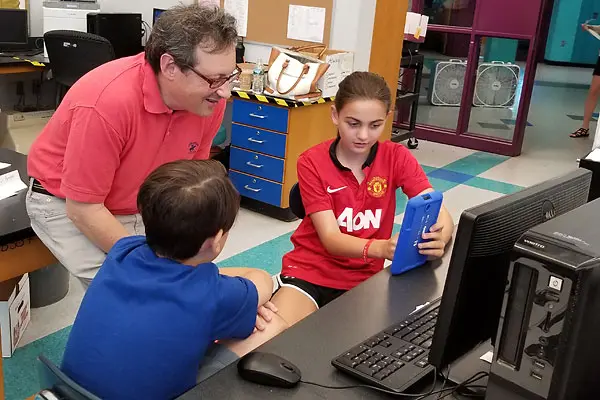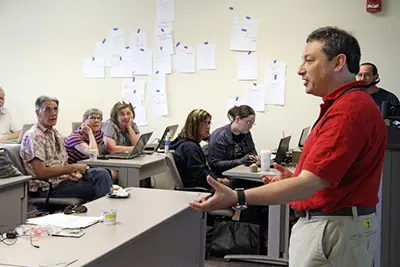Summer Camp Promotes Computer Science Education

Computer science Prof. Fred Martin teaches Medford middle school students Domenic Bruno and Maria Colombo how to create apps for mobile devices.
09/05/2017
By Edwin L. Aguirre
Nearly 60 schoolchildren in Everett and Medford learned programming skills this summer at a camp conducted by computer science Prof. Fred Martin and graduate student Chike Abuah. The initiative, which is part of the “Pathways in Computer Science” project funded by the National Science Foundation (NSF), teaches kids how to create apps for mobile devices that would help their respective communities.
“The collaboration is based on a three-year, $1.2 million NSF grant, which launched in 2014,” notes Martin. “Although this year is the third and final grant-funded summer camp, we’ve managed to reach a total of more than 1,200 kids during our partnership with the two school districts.”
Among the apps that the young programmers in Medford developed is a tool for finding the Medford Arts Resource Vehicle, or MARV, a school bus that has been painted bright blue and drives around the city to encourage participation in the arts.
“The kids were excited to learn about MARV from community partner Celia Lee of the Medford Arts Center,” says Martin, who is the director of student success at the Kennedy College of Sciences.
“The bus has been refurbished by Medford high school students. Several teams made apps to let you book MARV for your event, use GPS to track the bus’s location and show its calendar of activities,” he says.
In Everett, Sergio Cornelio, a community partner from the Everett Historical Commission, introduced students to important events in the city’s history. The students then created apps to educate others about what they learned. The apps use location tracking and sensors to give users photos and descriptions of what happened at various historical sites around the city.
Another Everett team was inspired by Rachel Kelly, a community partner from Everett’s Conservation Commission. The fledgling programmers made an app to help residents and visitors find the location of trash bins throughout Glendale Park.
All the students’ apps are available for download, free of charge, from the Google Play store.
A Valuable Partnership
“The Pathways in Computer Science is inspiring because of the effort that the community puts into it — from the schools that host the summer camps to the camp teachers and the students and faculty from UMass Lowell. Everyone does their part to make sure each kid has a motivating experience building their own mobile apps,” says Abuah.

Abuah, who hails from Abuja, Nigeria, is pursuing a doctorate degree in computer science, researching ways to build tools and technology to help people learn more effectively.
“These kids are incredibly lucky to be exposed to sophisticated programming at such an early age,” he says. “The camps help build confidence and impart real-life programming and computational thinking skills to the students. By the time they get to high school or college, they’ll be much better prepared for the challenges of the computer science curricula.”
“The project was a great way to introduce coding to my students,” says Lori Blank, a computer teacher at Lafayette School in Everett. “As the demand for coding skills grows, we can see that programming is playing a great role in almost every career path. It’s important to give students the opportunity to start acquiring the technical skills they need.”
Blank noted that the Pathways program is important because it is offered to less-privileged communities where students may not otherwise have access to such training. The program “showed my students how to think critically and become problem-solvers. It also helped them develop skills that allow them to build websites, apps and games on their own,” she says.
Jessica Hamerly, a math and computer science teacher at Medford High School, says a key benefit of the experience is that students learn to become creators of technology, not just users.
“These days, most kids are technology consumers when they play games or watch videos. Very few youth realize that there are tools available, such as App Inventor, that enable them to come up with real-world solutions to social problems in their own neighborhood,” Hamerly says.
“The summer camps teach students computational thinking concepts in a fun, accessible way. They also learn about the different types of jobs in computer science. The students who attend the camps will be several steps ahead of their peers,” she says.
A Strong Advocate for Computer Science Education
Martin has been active in robotics and computer science education since joining the UMass Lowell faculty in 2002. In 2007, he was recognized for his regional work with STEM teachers with the UMass President’s Public Service Award.
In 2015, he was selected to serve on a panel established by the Massachusetts Department of Education to create state standards for K-12 digital literacy and computer science. The panel’s work was approved in 2016. The resulting standards are guiding the adoption of K-12 computer science curriculum in the Commonwealth and serves as a model for other states as well.
 Image by Eddie Arrossi Photography
Image by Eddie Arrossi Photography
In July, Martin was elected to a two-year term as chair of the board of directors of the Computer Science Teachers Association (CSTA), which promotes and supports K-12 computer science education nationally and internationally.
With Martin’s help, Everett and Medford have adopted computer science curriculum that reaches all of their middle school students. He says it’s a model that could be adopted elsewhere to bring computer science education to even more school districts.
“For the CSTA, supporting policies that lead to computer science being introduced to all students is crucial. It’s a matter of equity of access and providing everyone with economic opportunities. Computer science skills will increasingly become part of all careers, and all learners, including girls and under-represented minorities, should have access to this knowledge,” Martin says.


